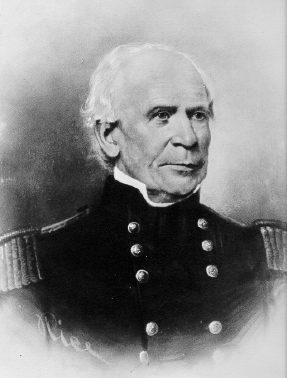12th Quartermaster General
May 1818 – June 1860
Father of the Modern Quartermaster Corps. General Thomas S. Jesup held the post of Quartermaster General for forty-two years. He has been described by one of his successors in that post as one of the most colorful and remarkable characters that ever occupied this position.
General Jesup was born in Berkeley County, Virginia, on December 16, 1788, the son of a distinguished Revolutionary officer. In 1808 at the age of 20 he was appointed a 2nd Lieutenant of the 7th Infantry, and in the War of 1812 he was a Major of the 19th Infantry at the age of 24. He was brevetted successively to Lieutenant Colonel arid Colonel for gallantry in action at the Battles of Chippewa and Niagara, was wounded several times, and was finally taken prisoner when General Hull surrendered to the British at Detroit. He was appointed Quartermaster General at the age of 30, and soon after taking office he promulgated a set of regulations for the Quartermaster Corps which showed a clear grasp of the problems of military supply. Many of his regulations were subsequently enacted into law. After he had served ten years as Quartermaster General he was brevetted Major General for conspicuous and efficient service, the functions of the Quartermaster Department, as it was then called, having been gradually enlarged and finally embracing all purchases for the Army.
In May, 1836, president Jackson detached General Jesup from his duties as Quartermaster General and placed him in command of troops sent to Georgia and Florida to suppress the Indian uprisings known as the Seminole War, where he was eminently successful, not only defeating the Indians but capturing large numbers of them, including Chief Osceola. In this campaign General Jesup was again severely wounded, but despite that fact he insisted upon continuing in command of the Army. As the result of his Florida service General Jesup’s name was mentioned as a candidate for president.
He resumed his duties as Quartermaster General in August 1839, after an absence of three years, and had charge of supply activities during the Mexican War. He was not content to remain in Washington, but took the field personally to insure himself of the adequacy of supply facilities. He did not hesitate to cut routine or to act directly in order to supply the Army, spending large sums of Government money for supplies without either Congressional or departmental sanction. Remarking that it was useless to ask for such authority, because Congress might impeach the President or Secretary of War for authorizing such expenditures. He was not only looked upon in his time as an expert in supply matters, but he was recognized as a tactician of ability. To the Secretary of War he voiced the familiar complaint of Quartermasters in all wars that it was impossible to obtain from troop commanders accurate estimates of requirements in supplies. He wrote to the Secretary of War as follows, “It is my duty to say that there has been no provident foresight exercised by any one in command, as far as I am informed and believe, but the officers of this department have, like myself, been obliged to guess what might be wanted, and risk an oversupply of same and not a sufficient supply of other articles.”
Toward the close of the Mexican War General Scott, who despite his success in the campaign for and occupancy of Mexico City, was himself under fire from many quarters, sent a long letter to the Secretary of War complaining about the lack of quartermaster supplies and the inefficiency of Quartermasters. The letter was referred to General Jesup for remark and, in returning it, he defended with vigor not only the efficiency of the Quartermaster Corps but of his subordinates therein, quoting in refutation of General Scott’s statement a report submitted by a Captain of the Quartermaster Corps then on duty in Mexico and, in referring to this quotation, General Jesup said “This information sir, was from a man who not only knew how to supply an army, but putting into requisition all the resources of the country around him, he was better qualified to command a large army than most of your generals in the field.” The use of vigorous language., of which the above quotation is a good example, in official correspondence was an outstanding characteristic of this gruff and, straightforward old soldier. Throughout his entire service he was a prominent figure in the public life of Washington. His advice was eagerly sought on all questions, He numbered among his intimate friends almost all the prominent statesmen of the half-century preceded the Civil War. He died in office on June 10, 1860.
Promotions: 2d Lieutenant on 3 May 1808; 1st Lieutenant on on 1 December 1809; Captain on 20 January 1813; Major on 6 April 1813; Brevet Lieutenant Colonel on 5 July 1814 for distinguished and meritorious service in the battle of Chippewa; Brevet Colonel on 25 July 1814 for gallantry and distinguished skill in the battle of Niagara; Lieutenant Colonel on 30 April 1817; Colonel 27 March to 8 May 1818; Brigadier General (Quartermaster General ) 8 May 1818; Brevet Major General on 8 May 1828 for 10 years faithful service as Quartermaster General. General Jesup was inducted into the Quartermaster Hall of Fame in 1986 (Charter Year).

